Text
Rory Gallagher: A Rap On The Road
HOT PRESS (December 18, 1981) Vol 5, No 25
The Rory Gallagher Interview
Prose by John Waters
Sidenote: this is about 4800 words, so maybe have a little time set aside to read it. The only edits I made were changing "Donal" to "Dónal" and adding the missing "s" to "Keith Richards".
You could say that I’m excited! When I collected my first ever pay packet back in ‘74, I went straight out and flogged it on the complete Rory Gallagher back catalogue and a couple of Taste albums to boot! For the next week, I remember, I was hungry, but very very happy!
Rory Gallagher has always declined to become involved in the excesses that often seem to prevail in the rock ‘n’ roll market place. In his music, and his public persona, he has steadfastly refused to make concessions of any kind in the direction of either commerciality or of fashion. He has remained his own man, doing his own thing, doing it well, and being successful. And while other (often less worthy and exalted) musicians have cut themselves off from their followers – isolating themselves in an aloof cocoon of bodyguards and hangers on Gallagher has always remained approachable, familiar, touchable.
To me, Rory has always seemed to be the antithesis of the Star Symbol for this reason, paradoxically, he has always been a hero of mine.
Yeah! You could say that I’m excited. To see Gallagher playing live is always a thrill in itself, but on this jaunt I’ll catch the final two gigs of his 1981 tour of British universities, tonight at Birmingham University, and tomorrow at Brunei in Uxbridge, London – and also meet and talk to Rory. In addition, it’s my first overseas assignment for The World’s Most Fortnightly Rock Paper and it will also be my first time to fly in an aeroplane. To mark the occasion, a colony of butterflies have organized an aeronautics display in the pit of my stomach!
And it’s still half an hour to lift off.
Later. Birmingham University: a venerable, rambling building, with huge, oaken doors, stained glass windows, mountainous staircases and vast mazes of dimly lit corridors with contraceptive dispensing machines that never work! It’s the kind of building in which you walk half a mile to find the toilet, only to discover when you get there that it’s about twenty feet from where you started out!
Gallagher is in his dressing room when we arrive signing autographs for a couple of stray fans.
His appearance is engagingly scruffy, looking marginally more like an unmade bed than I do. He’s wearing jeans and a T-shirt; his hair is uncombed, his face unshaven. He seems slightly heavier than before, his face is fuller. Apart from this he has changed little since first I saw him, back in his Taste days.
At Rory’s suggestion, together with his brother and manager, Dónal, we adjourn to a nearby watering hole for a drink.
Down in the Gun Barrel, for that is the hostelry’s handle, we talk about Irish bands – De Dannan, U2, Bagatelle, The Bogey Boys – and it transpires that Rory’s as up-to-date on what’s happening as I am.
He admires Moving Hearts a lot, but thinks they’re beginning to be hounded for their political opinions. He defends their right to hold such beliefs and to state them in their music without constantly having to justify themselves. Nobody, he points out, questions the right of The Clash to state what are often much more superficial and less passionately held viewpoints.
By now pre gig tension is mounting. Back in the dressing room, there’s a guy who writes for the college magazine, who would like to interview Rory. His name is Damien. He’s from Omagh, a definite plus! He’s only heard of Taste from his father - a slight minus!
Rory agrees to being interviewed, however, and Damien proceeds to interrogate him about the lack of ‘Irishness’ in his material. Gallagher is cautious, and also, I suspect, slightly hurt by the tone of the question.
“Everyone knows where I’m from,” he declares. “And I’m proud of it, but what are you supposed to do to prove it?”
In fact, as it becomes abundantly clear to me as the weekend progresses, any criticism of Rory in the matter of consciousness of his Irish identity is manifestly undeserved. Among the most abiding memories of the trip is the way he would talk animatedly and knowledgably about Ireland, about the political situation; about, for instance, the performance of the Coalition or the lack of it; about his disappointment with the seemingly unconditional support which has been given it by the “independent” deputies especially by Dr. Noel Browne, of whom Rory is a long time admirer.
“I think he was just trying to hinge on this business of writing the great epic Irish rock song,” Rory says of his interviewer afterwards.
Does he, I wonder, have a definite stance towards politics, and if so, does he think it should manifest itself in his music?
“I'm not mad about political parties or politicians generally,” he says. “I hate the whole system and all the rest of it. But that attitude gives you the great cop out. So that’s one side of the coin!
“On the other hand, if you have a serious discussion about the way history goes, you tend to say, well, certain people were not as bad as certain other people! Put it this way: I’m interested in modern history, so therefore I’m interested in modern politics; but I also know the baloney, and the crockery, and the jive and the crap that goes on.”
Does he not think his music should reflect this view?
“It’s hard to say. Most rock ‘n’ roll music is pretty apolitical. I dunno, I just do what I do. I’m not into proclamations!!”
So much for the politics, on to the poetry, the gig! Normally, I would say, a staid, almost gloomy environment, tonight the university hall is stuffed to its ancient rafters. The atmosphere is electrifying.
“I opened the door to go in,” said Dónal Gallagher afterwards, “and five people fell out!”
And he was not exaggerating!
Support band, The Rookies, have been off the stage for about twenty minutes when the lights go down, and a mighty cheer goes up. Gerry McAvoy runs on. Suddenly newest member Brendan O’Neill (whose recruitment means that it’s now an all-Irish-band – he’s from Belfast) is behind the drum kit. Last of all comes Gallagher, battered Strat dangling, racing on hands aloft in salute.
From here on, it’s Blitzville!
It is nothing short of incredible to think how many great songs Gallagher has written. Apart from the as yet-unreleased material that he performs, he has a vast repertoire of older stuff to draw from. So much so, in fact, that while the old favourites like “Last Of The Independents,” “Shadow Play,” “Philby,” “Tattoo’d Lady,” “Brute Force And Ignorance,” “Wayward Child” and “Bullfrog Blues” are coming thick and fast – it’s only afterwards that you think of all the equally good songs that he’s actually left out.
Nor has he lost any of his flair for histrionics: grimacing, strutting and tearing round the stage; or sustaining a note and tossing his plectrum six feet in the air during “Moonchild", catching it and playing on; or indulging in a bout of dueling guitars with Gerry McAvoy during “Calling Card”; or stopping singing, now and then, when he gets to a chorus, gesturing with his eyes - and the crowd comes in on cue with the hookline!
His song introductions are minimal, being confined to the occasional “here’s a little up-tempo number, hope you enjoy this one, thank you!” or some such understatement! There is a tremendous natural empathy between Rory and his audience, which eliminates the need for any explanations, introductions or other chitchat.
One of the highlights of his shows has always been the acoustic set. Tonight is no exception, and though unfortunately he no longer performs my personal favourite “Too Much Alcohol,” nevertheless the two songs featured – “Out On The Western Plain” and a Louisiana Red song called “Ride On Red” maintain the high standard.
The others come back on and it’s more rockers – “Philby” and a blistering “Shadow Play” after which Rory unstraps his guitar, yells the familiar “thanksamillion” farewell, shakes a few hands at the front, waves goodbye and disappears.
A thousand years later, he comes back (no snow rope encores here!) and launches into “Last Of The Independents.” He disappears again, but comes back for a thundering “Secret Agent” which explodes into “Bullfrog Blues.” Then he waves goodbye again and is gone, this time for good.
Afterwards it’s meet the fans time. It takes Rory the best part of an hour to get through the long line of people stretching down the narrow corridor leading to his dressing room. He’s in no hurry. Leisurely he signs autographs, shakes hands, talks about guitars or gadgets, greeting each new arrival with a friendly “howya doin,” are ye alright!
I notice two Japanese girls standing near the dressing room. Later I’m informed that one of them, Mitsumi, is the secretary of the Rory Gallagher fan club. They both attend most of the band’s gigs: “Anywhere from Tokyo to London” as Rory puts it. Each night they bring along a little present for Rory - tonight it’s an exotic box of chocolate biscuits.
When the last hand has been shook, and the last album cover signed, we climb into Dónal’s Jensen and speed off through the night (do I sound like Julie Boyd?!) in the direction of London, the scene of tomorrow night’s gig. The plot is that I interview Rory in the car on the way; but a few miles down the road, fate and a flat tyre intervene, and as we discover the spare is also flat, Rory and I end up in the nearby “Watford Gap," a late night diner, while Dónal goes off in search of a garageman to repair the puncture.
Rory informs me that back in the old days “The Watford Gap” used to be a great meeting place for bands in the early hours of the morning, after gigs. Nowadays, he jokes, bands might not like to be seen here “without their makeup!”
The restaurant, seemingly in the past a somewhat sleazy joint, has recently been renovated. Rory jokes that he hopes the fact that it’s been “Ritzed up” doesn’t mean that the eggs are less greasy! (He needn’t have worried!) Like myself he’s a martyr for the health foods I don't think!! He orders a big plate of sausage, bacon, eggs, beans and chips. I do likewise (though minus the eggs) and we sit down at one at one of the nice new tables, to eat and to talk.
I enquire how he came across new drummer Brendan O’Neill, who replaced Ted McKenna some months back, Ted, I understand, is now playing with Greg Lake, as indeed is Gary Moore.
“Well, I’ve known Brendan for a couple of years,” explains Rory. “He’s been living in London, and, in fact, he was the first drummer that Gerry used to play with in Belfast, and he was working with this jazz rock group called Swift, so I didn’t even know he was into playing this kind of music, but as luck would have it we played together and it worked out fine. He’d kind of gone through the jazz rock thing phase, and seemingly was interested in playing … (laughs) … whatever it is we play. I hate putting a title on it any more!”
Speak of the Devil. Brendan and Gerry, who have been traveling in another car, arrive with Peter, the band’s road manager.
It transpires that Brendan once played with an Irish showband, The Real McCoy, and this brings forth a store of showband stories, which we swap happily for half an hour. All of them unfortunately are unprintable due to the laws of libel! Sorry!
This conversation prompts me to ask Rory later if there was ever a time when he could have been sucked in irreversibly into the showband trap. (He did, after all, spend a couple of years playing with the Impact Showband at home in Cork, while he was still at school.)
“Not really. I was extremely determined to get out, because after playing Jim Reeves’ numbers secula seculorum, you’d (shakes head)…naw!!
“Let’s put it this way,” he adds. “Mathematically it’s possible I could’ve ended up playing in a showband, but knowing myself it wouldn’t have happened. I had my fill of them up to here. When I left the showbands for good, I said ‘that’s it!’ No Way!!
“I was only there really about two years, but in that two years I got around the country, and did the Lent tour of England a couple of times. (Note for English readers: the Lent tour was a traditional annual part of Irish showbands life. The dance halls were closed during the six week’s preceding Easter, a “penance”, you see, which was strictly enforced by the Catholic hierarchy – and consequently the bands had to go to England for the duration in order to make a living!)
“And I was in Spain once too, so it was an experience and I was stuck in school, so I couldn’t complain!
“It was still a thrill to actually plug into an AC 30 Vox amp, y’know (laughs). It’s only when you start getting more serious about the music you want to play and don’t want to play, y’know. You don’t want to be going around doing covers of ‘Hucklebuck’ or covers of Jim Reeves, or covers of anything, really!
“You had good showbands and bad ones of course. You had a good brass section with The Plattermen, good singers with The Freshmen, or a certain band would be terrible, but the sax player or the guitar player would be great. You’d always get that in showbands.
“But the band I was in, I mean I tried to push them into doin’ as much Chuck Berry or R‘n’B ish kind of things as possible. We used to do things like ‘Slow Down,’ ‘Nadine,’ ‘Johnny B. Goode,’ all those sort of things. So that would keep me relatively happy. But then we’d still have to do the stuff in between, a couple of pop ones, a couple of country ones, y’know.
“Of course there’s a certain amount of crack in the showbands. There’s an amazing amount of fun that goes on and carry on. But if you’re playing five hours a night and half the time you’re just plonking away, it gets claustrophobic! And if the other musicians don’t relate to the sort of music you’re fond of its frustrating.
“That’s not to say that you can be too high ‘n’ mighty. I mean the showband players have every right to work in a band like that, and they’re happy doin’ it. And you can be very cynical about it but by the same token, you have to give them credit. They’re playing music – they’re playing dance music, and they’re entertaining people, and I’m the first one to knock them for six but y’know, who am I to dictate?
“It’s up to yourself whether you want to go off and starve in Hamburg, or starve in London for a while, and wait for a break that is a long time coming. That's the way it goes!”
Brunel University, Uxbridge, the scene of Saturday night’s gig is a fairly modern complex (or at least what I saw of it was) on the outskirts of London, in fact it’s just a plectrum’s throw away from Heathrow Airport.
Unfortunately the night is marred straight away by an instance of bureaucracy gone wild. Because they’ve got a bee in their bonnet about some previous visiting act doing damage to the dressing rooms, the college authorities are refusing to allow the band to have the use of this facility. As a result, Rory, Gerry and Brendan must change in of all places - a squash court!
Thus, when Rory and I sit down before the gig to conduct, as he puts it, the “meat and potatoes” of the interview, ensconced in two armchairs placed by a Super Ser in the centre of the court, and dwarfed by the sheer vastness of the environment (not to mention frozen), we could be two forlorn characters plucked straight out of some fanciful Beckett scenario, bent on some surreal existentialist spree!
In actual fact, we’re bent over a tape-recorder, and what follows is a veritable valley of questions and answers.
His new album, he reveals, is to be called “Jinx.”
Rory: “Yeah, we’ve got it recorded, it just needs mixing. It was supposed to have been released in late autumn, but we were too late in finishing it. And then the tour came up, so trying to rush it out for Christmas, type of thing, would’ve been silly, because it’d just get lost in the shuffle, and you mightn’t even have done it properly, y’know. So this way is better!”
Having heard a number of the songs last night, the stomping ‘Double Vision’, the bluesy ‘Ride On Red’, to name but two, I can vouch for their quality, but what about the other songs which have not, as yet, been assimilated into the set?
“Well, let’s see. There’s a song, called ‘Loose Talk’ which we haven’t done on stage. There’s a song, called ‘Signals’, which you haven’t heard it’s a spacey, kinda fast one.
“There’s the song ‘Jinxed’ itself, which is quite slow kind of Latin blues type of feel to it. It has a kind of Latin American beat, but it’s actually a blues number. It’s quite interesting y’know, with tom toms and stuff, and it’s got a couple of saxes on it as well... it’s got quite a spooky atmosphere, that one!
“There’s a song we’ve been doing called ‘The Devil Made Me Do It’, a very fast Eddie Cochran sort of thing, not quite rockabilly, but a very fast sort of driving one. And then there’s ‘Easy Come, Easy Go’ which is a kind of a minor … I’d call it a ballad, really, but it’s a blues ballad something in the vein of ‘A Million Miles Away’. That type of stuff!”
Immediate plans involve mixing the album and hitting the road again in the New Year. There’ll be continental gigs, some in Britain to coincide with the release of the album and in Ireland around Easter, if current projections are met.
“But next year, our main aim is to try to get back to the States, and be a bit more active there,” he adds.
Gallagher obviously has lost none of his commitment to touring, in fact, he spends on average, between six and eight months on the road each year. In the past twelve months, for instance, the band has visited Australia, New Zealand and France, and also played two dates in Greece, one an open air gig in Athens, the second indoors at Salonika.
As Greece - what with the repressive junta regime that existed there up to the recent election, has never exactly been on the beaten track as far as touring rock bands are concerned (the last band to perform there were The Rolling Stones... in 1967!!), one might have expected some enthusiasm. In fact, at the Athens gig, there was a full scale riot!
“They expected fifteen thousand people,” explains Rory, “and that’s serious! And I said ‘well, they must be kidding!!’ I didn’t realize that you could have that amount, but as it turned out, there was twice that many, or thereabouts, but half of them were outside, and either they supposedly gate crashed, or else the police over reacted because the audience were all up on their feet.
“It was a great gig really if I say so myself and, all of a sudden, the police started getting a little heavy with the audience, things started getting a little bit hard, y’know. We were just playin’ away it really only all happened after the encore. The crowd were grand, but y’see they don’t have all that many big shows like that, and I suppose the police were nervous. There was the election coming up, as well, in two weeks or something, so I think they used the concert as an example to show how they could keep control of a crowd, or something like that
“The trouble in a situation like that is: if you get too much of the strong armed approach towards a couple of fans, it’s seen, and it goes through the auditorium or the arena very fast. Naturally enough, when the word gets out, it gets very nasty, and if you’ve got guys there with riot gear on, and stuff like that, it makes matters seem worse.
“People were hurt (300, in fact), I dunno, I only heard the reports afterwards. A couple of the police were hurt, and quite a few of the audience.
“They all made it home somehow or other, but I think they burned down a few cafes on the way!! But that’s not in my fault!”
Were there any repercussions for the band?
“We had to move lightly on our feet, because there was a hint that I might be held as some sort of a trouble maker. They were talking of putting off the show in Salonika, after Athens, but that went of fairly well, there was no problem.”
Would he go back there?
“Ah I would yeah. Sure. I wouldn’t go back if the junta were back in power, but I don’t think that’s gonna happen.”
Will he be let go back?
“Well the Socialists actually won the election out there, so I think it’ll be all right. I think it was just a nervous situation, y’know.”
Quick change of direction: does he listen much to current music?
“I'm all ears, all the time! I could reasonably claim to be fairly aware of all kinds of music. I can’t say I’m all that switched on by a lot of recent stuff, but if I’m going to criticize something, I like to actually know what I’m talking about!”
Has there been anything at all recently, that he particularly liked?
“Lemme see… I’m thinking too hard so obviously there hasn’t been anything. I like the Stray Cats, I liked their first album – I’m not that daft about the second one though. Costello I like a lot, but I don’t regard him as being that new at this point.”
How did he feel about Costello’s recent foray into the world of country music?
“Well I’m a country fan myself, but not of the sweeter stuff. I like Johnny Paycheck and Waylon Jennings, and I thought he was gonna do something like that, but in fact he went for the sweet stuff, the strings and voices. And the producer, Billy Sherrill, even though that TV programme (recent ITV documentary about the making of Costello’s album in Nashville - shown as part of the “South Bank Show” series) gave the impression that he was into orchestrations and all that sort of thing, on the other records he just doesn’t have all that stuff!
“Nevertheless it was a worthwhile project –you’d wonder though whether he’d have got a better result by just goin’ into a studio with Nick Lowe and a steel player, and just goin’ for more of a honky tonk sound.”
What other music does he listen to?
“In any particular week, I listen to … I could be listening to rhythm ‘n’ blues tonight, and tomorrow I could be listening to fairly contemporary stuff. I used to listen to a lot of jazz, but not so much any more.
“I still like music that sounds fairly human, I suppose that’s a corny way of putting it. But I’m not keen on – I’m not against synthesizers, but y’know the current wave of bands, I’m not keen on them, the New Romantics, and stuff like that, it doesn’t appeal to me! I tend to still have lot of respect for the more traditional names like Dylan and the Stones and people like that!”
Does he have an ideal rock ‘n’ roll person?
“Well I mean Keith Richards, might be the obvious modern day, ultimate rock ‘n’ roll figure or Chuck Berry, I imagine, or Jerry Lee. There’s loads of them y’see (laughs) but I don’t really believe in, this thing of making…”
What about Elvis Presley?
“Oh yeah, I’d personally strangle that guy (Albert Goldman) who’s written that new book. I haven’t read it all, but I read the extracts in Rolling Stone. He couldn’t have written that book if Elvis was still alive, because of the laws of libel the dead can’t come back and sue! Y’know? Hopefully though, Elvis will haunt him yet with a bit of luck!!
“No one’s above having their lives reviewed and written about, and so on, but y’know, how can you sit down and say something like ‘as Elvis lay on his bed, he thought to himself… Or, as Elvis said to himself as he walked onto the Vegas stage for the last time’. That’s fiction!
“If Charlie Gillet had written it, or Greil Marcus, or one of those fellows, somebody who likes rock ‘n’ roll, but this guy actually likes Benny Goodman. He was on TV recently, being interviewed, and he said that Elvis was only basically a good copyist of demo discs and he just wrote him off! And that’s not on! I’d be surprised if he even has an album at home. I mean that’s where I’d draw the line. If Elvis did good things or bad things – well everyone has gotta answer for themselves, but you must remember that Elvis had to live in a very… there wasn't much allowance. It was a very strict society. Keith Richard can get away with almost anything now, or Jagger or any of these people. Society is going that way now, and that's fine! But people expected Elvis o be perfect all of the time, y’know!
“I think too much has been made of turning rock ‘n’ roll figures into some sort of deities, of elevating them too much. Everyone likes praise, and everyone likes to see certain artists admired y’know, or held in esteem. But if it’s taken too far I think it gets a bit lopsided, particularly if you know one or two of them, if that’s not a prim thing to say and you know they’re only human, and they can only do a certain job.”
Is this why Rory has always ensured that he remained approachable? Or does he think about it at all?
“Ah not really. I mean I don’t see myself as approachable all of the time. But I just try to keep a wee bit of… I try to keep my feet somewhat on the ground. I suppose I – I’m getting into analyzing myself now (laughs) which I don’t really like, but I mean, I have avoided certain trappings of the thing because I think they ruin rock ‘n’ roll or whatever we play. The mess people’s heads up, and it’s a hard enough business as it is! I like to keep a certain amount of control of what I do, and you’ve to make sacrifices for that you have to cut down your stardom (grimaces) ambitions. At least this way you can attempt to make fairly decent music - make decent albums, and play for the fun of it without getting too carried away!”
Saturday night’s gig goes off well. There is marginally more room to move than the night before, but as the venue is at least twice the size of the Birmingham one, there is probably in fact a larger attendance.
Afterwards Rory, Dónal, Pasquale (who handles the band’s continental promotions) and I head into town to eat, and proceed to assault our respective brains with consecutive bottles of Carlsberg Special and sundry other beverages.
I’m struck, as indeed I was many times throughout the last couple of days, by the wide range of Rory’s interests. For perhaps four or five hours he talks about everything under the sun - music, venues, movies, tennis, politics, Elvis, religion, spies and music. And they’re just the things I can remember!
Much later, Dónal drops me back to my hotel, where I should be able to grab about twenty minutes sleep before catching my early morning flight.
Packing a suitcase, I reflect on what a special kind of person Rory Gallagher is: what an amiable, interesting companion and what a down to earth human being. And what a superb musician as well.
And it dawns on me again just how well that first pay packet was spent.
#rory gallagher#hot press#hot press magazine#irish blues#blues rock#irish musicians#ireland#donal gallagher#1981#my posts
1 note
·
View note
Text
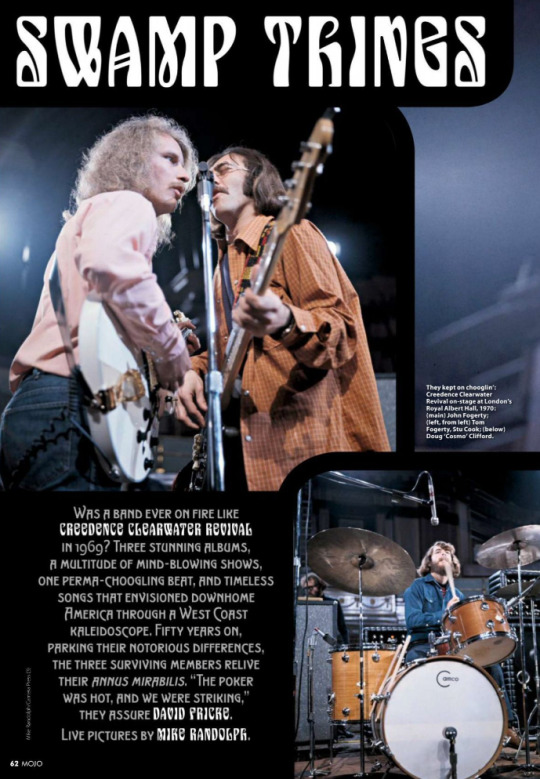
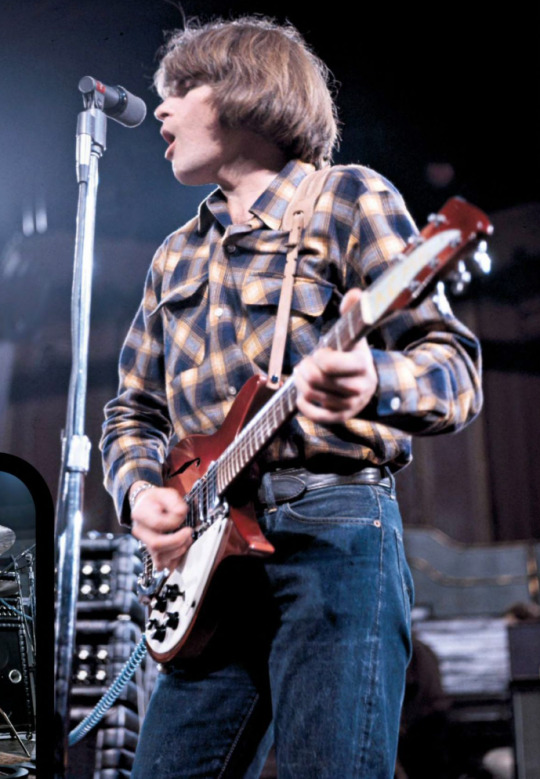
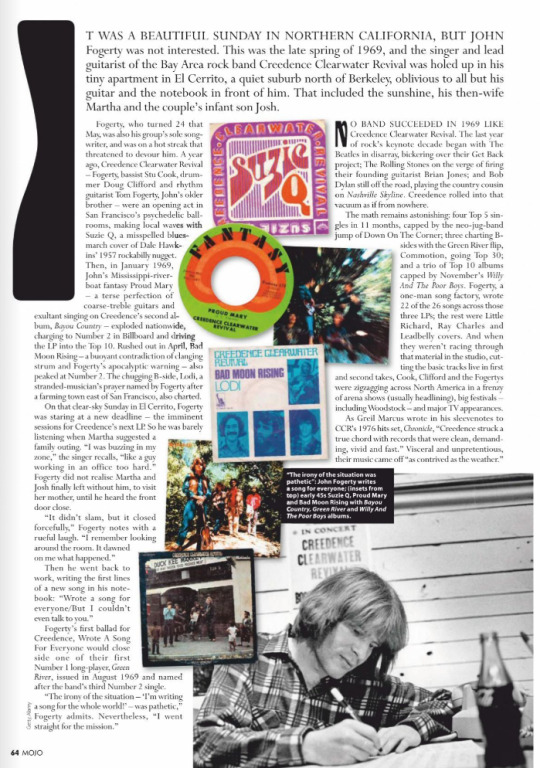

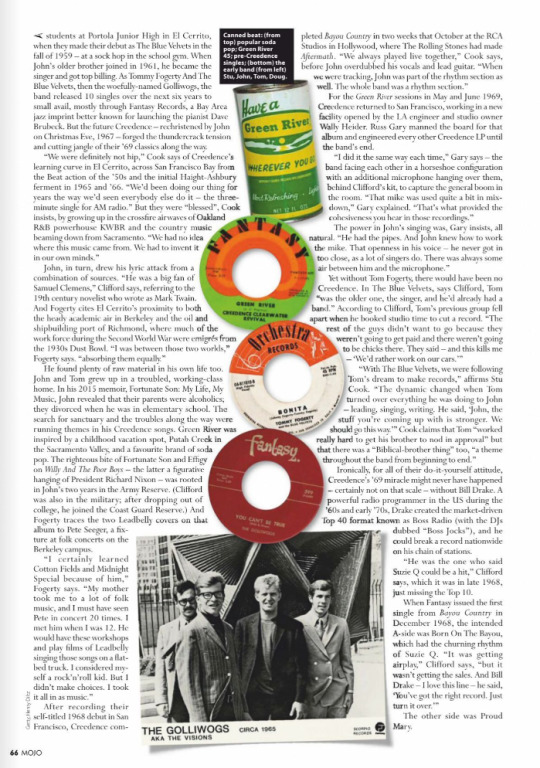
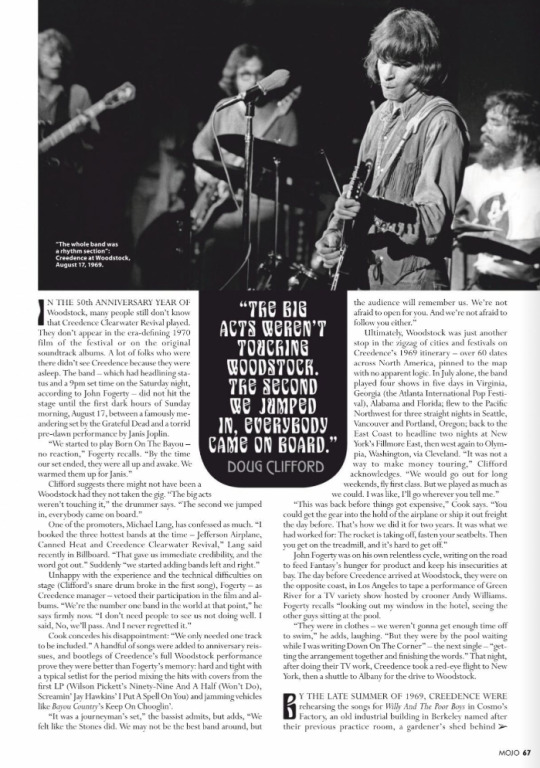
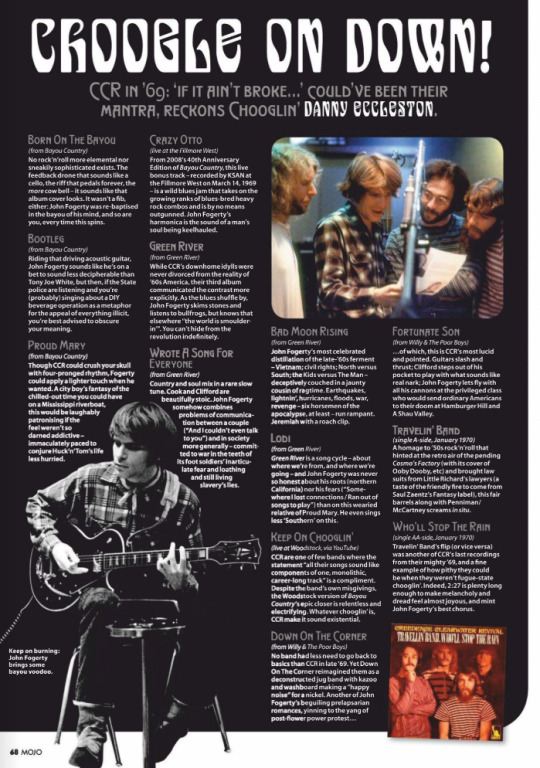
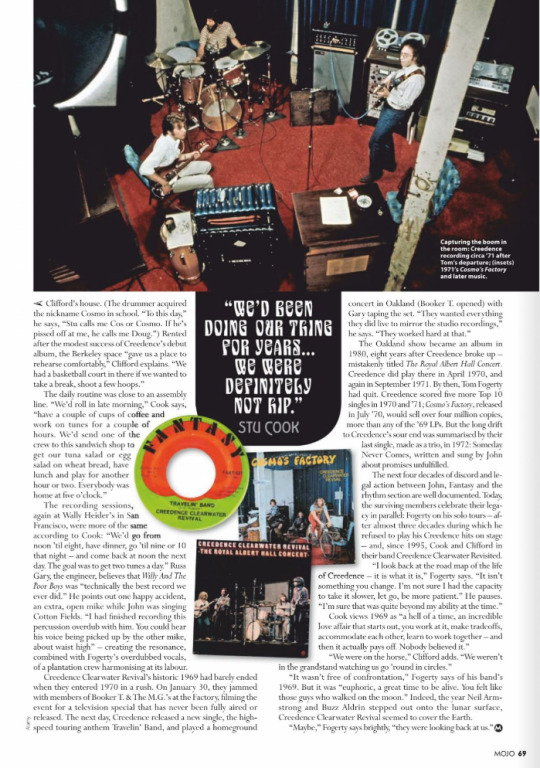
Creedence Clearwater Revival article in the July 2019 issue of MOJO.
4 notes
·
View notes
Text




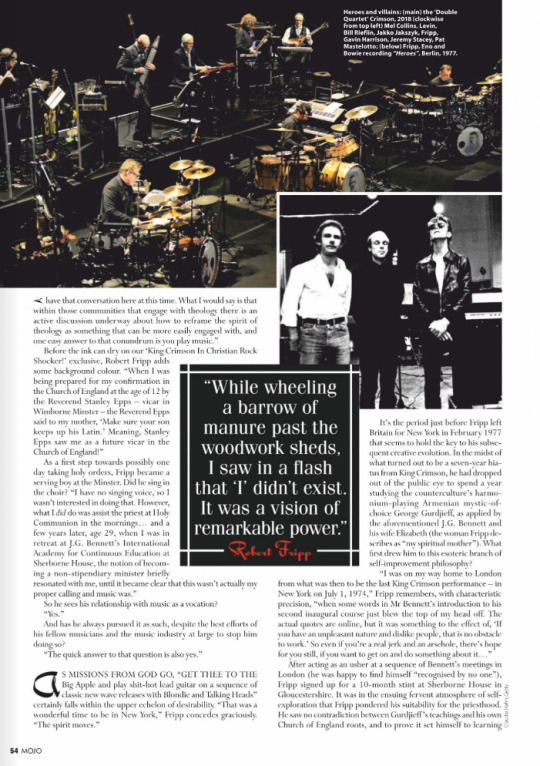

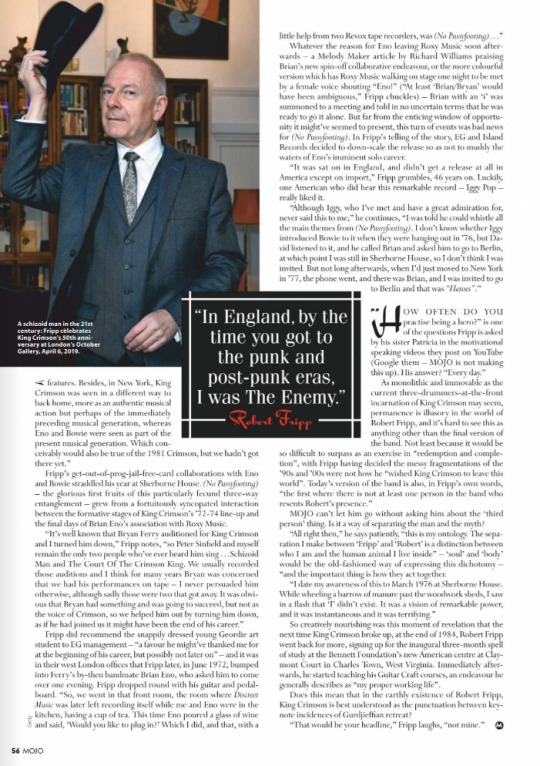
An article on Robert Fripp and King Crimson, from MOJO's July 2019 issue.
7 notes
·
View notes
Text
Info!
Not all of the scans/photos are mine, but the transcripts and translations are. I don’t speak every language I translate from, so if you are a native speaker and notice an error in the translation, please let me know!
Organizational tags are usually the following:
year
publication
band/artist
Not every post about a group will have the members’ names as tags, it will usually just have the band name. Also, some publications may have multiple tags (for example, #nme magazine / #nme)
If the original post is not mine and I have reblogged it to add something, it will be tagged as either #transcript reblog / #info reblog / #translation reblog
0 notes
Photo


Malevolent Creation
1990
Holocaust Zine #4
#malevolent creation#malevolent creation band#death metal#heavy metal#american death metal#1990#holocaust zine#reblog
26 notes
·
View notes
Text
These are images from the May 2017 issue of Eclipsed Rock Magazine. Although I can’t get the actual pages from the magazine, this is the summary given by the magazine:
BLACK SABBATH - From the Swabian Province to the World
It's done. The live chapter Black Sabbath has been finished since February 4, 2017 with the last concert of "The End Tour" in their hometown Birmingham. One of the first stages of the Doom and Metal pioneers in 1969, even before the first album was released, was Baden-Württemberg. The first concerts in Germany as Black Sabbath took place in the Swabian province. Tony Iommi, Ozzy Osbourne, Geezer Butler and Bill Ward felt so at home there that even when they were already in the charts with their first LP, they returned to the charts at the end of April 1970. We accompany Sabbath on her first years as a tour band and garnish the whole thing with exclusive photos.
The two pages above, translated from German:
“I haven’t yet realized that it really should be over.”
Geezer Butler has yet to process the end of Black Sabbath.
BAS(S)IC INSTINCT
Interview with the Sabbath bassist
~
“To my shame and sorriness, I can say that I was a complete alcoholic at the time.”
Bill Ward, pictured here onstage at Schorndorf’s Club Manufaktur on December 20th, 1969, speaks about Dio’s “Heaven and Hell.”
IN HEAVEN & IN HELL
Interview with the Sabbath dummer
I’ve also found, on the Black Sabbath 70s facebook page, an album of photos that were taken of the band on the 20th and 21st of December, 1969, which also includes the three photos from OP.



Black Sabbath, Germany 1969
445 notes
·
View notes
Text
Here’s the transcript, though the scan quality is pretty good.
Purple to cut album in Munich; autumn gigs?
DEEP PURPLE, who flew to Italy this week for an appearance in the Rimini Festival on Saturday, travel on to Munich where they spend the first three weeks of August recording a new album for November release. They then leave for a lightning American tour, headlining four stadium concerts. A spokesman for the group said this week that, although no British dates are yet confirmed, the group are expected to undertake some concert appearances here during the autumn.
Purple's Jon Lord has his solo album “Windows” released this weekend. It was recorded in Munich with the orchestra of the Munich Chamber Opera, and is a classic-style set. One side is the completion of an unfinished work by Bach, and the second half is the continuation of Lord's own “Gemini Suite”.

New Musical Express, 27th of July, 1974
Festival in Rimini didn't happen, nor did the autumn UK dates
3 notes
·
View notes
Photo
I went ahead and transcribed this interview!
With the exception of Gillan’s photo on the first page, the member pics have captions:
Ritchie Blackmore: Freedom and volume
Ian Paice: In at the start
Roger Glover: A little help for Ian Gillan
Jon Lord: Solo work as an insurance policy
Since this is a lengthy article, I’ll put the main text below the cut.
DEEP PURPLE'S JON LORD TALKED TO JOHN BAGNALL
Deep Purple - Glass Idols?
One of the most amusing quotes that I've encountered in recent months was attributed to America's latest rock phenomenon, Alice Cooper. “People just don't realise,” he sobbed, “how lonely it is at the top.”
He was, of course, voicing an age-old showbiz cliche. It was amusing because Cooper, typically, was fastidiously engaged in camping it up for the benefit of the assembled reporters.
But his words had a peculiarly hollow ring of truth. It is lonely at the top — and many rock bands have experienced the bitterness and sniping that comes hand in hand with any major degree of success. It's not easy to get to the top of the rock music ladder. Once there, it seems that there are always people around who would be happy to see you fall.
Ask Deep Purple because they've experienced all the back-biting and pettiness that success sometimes brings. Just as they've been given credit for their achievement in bringing rock music a certain amount of respectability, so they've also been slated, from many corners of the music business, for their alleged pretentiousness, triviality and commercialism. Just as Deep Purple In Rock had been acclaimed as the definitive album of the English heavy rock movement, so Fireball was criticised as being banal, repetitive and complacent.
And, at some time in the middle of last year, it did seem as if there were grounds for doubt as to Deep Purple's musical future. Ian Gillan had collapsed at the start of the band's second and most important American tour. There was speculation as to his future as a singer — and about Deep Purple's future without him. There were also rumours of a split in the band's musical and creative outlook. Jon Lord had been closely involved with his interest in classical music and it was well known that not all the band were sympathetic to his ideas. Ritchie Blackmore, in particular, had been known to voice his opposition in public. Potentially more disastrous than the rumours was the fact that the band themselves seemed to have little idea of what was happening.
It did look, during that period, as if Deep Purple had come to the end of a lengthy and successful career. They had originally come together some five years previously, when Jon Lord, late of The Artwoods and The Flowerpot Men, brought the band together with Ritchie Blackmore (guitar), lan Paice (drums), Nicky Simper (bass) and Rod Evans (vocals). Simper and Evans later left, to be replaced by Roger Glover and Ian Gillan, who joined from a pop band named Episode Six.
EXCITING
The new band found themselves in a position mid-way between their pop-orientated backgrounds and the first stirrings of the progressive revolution. Their first singles (listen to Hush and Kentucky Woman) were very much cast in the pop vein; their first three albums, Shades Of Deep Purple, The Book Of Taliesyn and Deep Purple were similarly 'smooth' — but beginning to show the quality of musical aggression that has characterised their better-known work.
But Deep Purple had to wait for their fourth album to find the general success that had previously been eluding them. The album was Deep Purple In Rock, and it set the seal — in the most phenomenal proportions — on their career as a rock band. Its release came at a time when the heavy music audiences were looking for an identity - and In Rock proved to be the catalyst. It stayed in the album charts for over a year, carving a niche for itself in the documented history of rock music, and establishing Deep Purple as an international force in the heavy revolution. They became known, in the absence of Led Zeppelin from the concert circuits, as the most exciting band on the musical scene.
They were loud, very heavy, and their stage act had, in Ritchie Blackmore's habit of setting fire to his amplifier (having smashed his guitar to the accompaniment of a battery of strobe lights), all the ingredients that rock audiences wanted.
But then, just as Deep Purple seemed to have reached the plateau of success, along came that bad patch....
When I met Jon Lord, it was the first day of Spring. The afternoon was warm and sunny, and he was wearing a smile to match. The acetates of Machine Head, Deep Purple's new album, had just arrived — and Lord, with a touch of down-to-earth reticence, admitted that he was “chuffed to buggery” with the result of the sessions.
We sat in his manager's office, just above the familiar facade of London's Marquee Club, and he talked freely of Deep Purple, their problems and their successes. At one point Chris Farlowe, fresh from his German debut with Atomic Rooster (Beat Instrumental, April), wandered or, rather, burst in, to say, hello. Apart from that, we were undisturbed.
Beat Instrumental: Last year — 1971 — was a bad year for you. I suppose that the main problem was lan Gillan's illness — could you tell me just how serious it was?
Jon Lord: Well, for a long time we weren't sure how long lan would be off the road. We had to face the possibility that it might take a long time — or that he might not be able to sing again. I don't think, in all conscience, that we could have got another singer. Deep Purple is too personally involved. For a time… it looked as if we might have to break up. We couldn't envisage the band with another singer.
B.I.: How did the prospects worry you?
Lord: Well, it wasn't just lan — both Roger and Ritchie were also ill. It was pretty frightening really, just when we were beginning to crack things. It was like having the carpet pulled out from under our feet.
B.I.: There were a lot of rumours around at the time. With lan off the road, the band weren't working as Deep Purple — but you seemed to be doing a lot of solo work....
Lord: I think people did take that the wrong way. I was doing things like Gemini and the Tony Ashton album — but then, we've always tended to follow our own ideas outside the context of the band. At one time there might have been a little confusion within the band, but I think we resolved that a long time ago. The solo work is really just an insurance policy against going mad…
STIMULI
B.I.: In what sense?
Lord: It helps to relieve the tension of being in a band of whom a lot is expected. The pressure on us, to keep up our standards, is enormous. In Deep Purple, we play together a certain way, under certain sets of basic ideas. Solo work allows you to work under a different set of stimuli — you get new ideas. The Gemini Suite album was just a nice rest. The Tony Ashton album allowed me to work out some of the songs I've written that wouldn't have been right for Deep Purple. It was the same for Tony - he was able to use ideas that wouldn't have been right for Ashton, Gardner and Dyke. I'm sure, by the way, that Tony's going to make it someday. His songs are very simple, very gutsy, very funky… he writes some outrageously good stuff.
B.I.: Do you find it easy to relax ? Deep Purple's music has always seemed to be very… “high pressure”.
Lord: I'm high pressure myself — I work best that way. But I'm trying to learn to relax. I think Deep Purple is learning the value of relaxation - the value of “not putting a note in”, where once we'd have played fifty.
B.I.: Have you found it easy?
Lord: Not entirely. The trouble with working in a band is that you have to live out all your changes in public… all your fantasies and desires. It's like doing some kind of private thing in the middle of Trafalgar Square — you're very naked. That was why we recorded Deep Purple In Rock. We felt the time had come to make a very definite statement about the band — to say, once and for all, that Deep Purple is this.
DISAPPOINTING?
B.I.: For many people, Deep Purple began with the In Rock album.
Lord: I think that's probably true. On the previous albums we'd fallen into the old trap of putting our “album hat” on. I don't think they were very representative of the band as it was. As I said, In Rock is a statement about us. We wrote and recorded it in two weeks. We had a burst of ideas. In that moment, things got a little bit frantic — it's a very high-pressure album. Coming back to what you were saying about relaxation, I think you'll find that Machine Head is very much more relaxed than Rock was.
B.I.: Are you pleased with it?
Lord: I'm chuffed to buggery with it! I think the band is more unanimously pleased with Machine Head than with anything else we've ever done. I must admit that I was surprised when Deep Purple In Rock was such a big hit. It was a good album to me, but it had faults — but good, honest faults.
B.I.: What about Fireball? It didn't really take off — I think a lot of people found it disappointing.
Lord: Personally, I think Fireball was a better album than a lot of people said it was — musically. But I agree that it didn't really do much. I can think of many reasons. As I was saying, In Rock was recorded within very narrow limits — we wanted it to make a very definite statement — and we threw an enormous amount of material out. Then, suddenly, it was time to make the next album. With Fireball, we'd relaxed a little bit too much. I think it was better musically, and in organisation, but it lost a lot of… balls. Also, we were working so incredibly hard and there was very little linkage between sessions. It's important to have a kind of emotional link when you're recording. Fireball, which took six months to record, didn't have that. But a lot of people write and tell us they liked it more than In Rock.
B.I.: How does Machine Head stand in relation to the previous albums?
Lord: It's a natural extension. It will re-affirm the balance of the last two albums. It combines all we learned about the musical concept from Deep Purple In Rock, and all we learned about sound from Fireball. I've only got one small criticism of it, which is a very minor and personal thing — it doesn't contain a slow track.There's nothing like Child In Time. But I think the songs are better than on anything else we've done before. The standard is improving all the time. It's very difficult to record hard rock songs that communicate effectively — but I think we've been very successful with the material on Machine Head.
MUSICAL
B.I.: Is your music still as heavy as it used to be?
Lord: I don't think so — the heavy thing has started to level out now to a sensible level. Bands aren't as heavy as they used to be — or, at least, they're not fighting to be louder and heavier than each other any more.
B.I.: You have been criticised in the past as being too heavy. Were the critics justified?
Lord: I don't think so. We've always tried to use volume for a purpose. We've never used it as an end in itself. Our music wouldn't be the same without the intensity of equipment we use. Certainly we're not as loud as we used to be — we're using a bigger P.A., but we've reduced the amount of stage equipment. Volume is important to us but we'd never want to deafen anyone or alienate them.
B.I.: How do you think Deep Purple comes across to its audience? You mentioned the subject of communication.
Lord: I don't really know — I find it very difficult to put myself in the shoes of the audience. We don't try to come across intellectually. Music, to me, is something that makes you feel good and which sounds nice. In that sense, we're just trying to be musical. A lot of people in the past, without thinking, have described Deep Purple as unmusical. I don't see how anyone can possibly say that — I've never played with four more competent musicians. I think we are musical — but we don't set out to come across as super musicians.
CONFIDENCE
B.I.: Do you find that most of your audiences take you in the same way, or do they tend to vary? Whenever I've been to see you, the audiences have been the “get up and freak around” type.
Lord: We hit extremes — the audiences vary considerably. At one gig we got the kids up on their feet, dancing around and going wild. At another, they hardly reacted at all — not, at least, in a physical way. Sometimes they'll sit through a number like Speed King perfectly quietly, and then give you a kind of polite applause at the end. Usually, though, it seems to come out somewhere in the middle — they'll sit and listen to the music, and save the “freaking around” until afterwards. I find I'm constantly surprised by our audiences. But it doesn't worry me how they want to react, being in a rock band. If I was in the Incredible String Band, or something like that, then it would.
B.I.: Lately, of course, you've been building up a very large following in the States. How have you reacted to it? Do you think that playing in the States has changed your music in any way?
Lord: I think the most important thing is that it's given us much more confidence in ourselves. When you've played some of those venues, playing your music to thousands of kids, then you know that you can play anywhere. And our success over there has helped to confirm our belief in what Deep Purple is doing.
ENVIRONMENT
B.I.: Has it actually changed the content or structure of your music in any way, though? You must have picked up something of the way an American band approaches the concept of its music.
Lord: I think playing with American bands has helped us to find a rather more relaxed approach to our music. American bands have an ability to lay it down without any apparent effort. We did a tour with Buddy Miles — his music is nothing like Deep Purple's, but he taught us a lot about communicating with an audience.
B.I.: What do you think of America from the point of view of playing in that kind of environment?
Lord: It worries me. I don't like going there — it's such a very… uptight society. It's difficult to find any escape from it — which, I suppose, is why rock music is so big amongst American youth. It's the most natural form of escape.
B.I.: Just how big is the American rock culture, compared to the way things are over here?
Lord: It's incredible — the whole thing is so big. Working over there places an incredible strain on you. It's very demanding on your personal life. People tend to think of you in God-like proportions. They think you shoot, take, pop everything that moves. The drug scene out there has reached such staggering proportions — it seems that the next turn-on, for most people, is the most important consideration. And they expect you to be like them or, rather, what they'd like you to be in terms of their own ideals. They assume you take drugs because they do. We don't use drugs, but people over there won't believe you if you tell them you're not into it. They just say that you're putting them on. That phrase must be the most used expression in the States today: “Man, you're putting me on”. After a while it gets so boring telling them that you aren't what they think that you just ignore it.
B.I.: Do you find that they tend to read too much into your music? There seems to be this incredible preoccupation with “messages” in music.
Lord: We're always getting letters from people trying to analyse our songs. It seems to be a habit over there. Look at American Pie — there are already books on what the lyrics mean. They want to analyse everything. At one gig we did I played the theme of Sabre Dance, just for a laugh. The next day some guy wrote that I was making a statement about war!
ANTI-DRUGS
B.I.: Does it worry you?
Lord: Well, it gets to the point where you just let it wash right over you. You take notice of what seems important, and ignore everything else. That's why I like playing in the U.K. — audiences aren't so preoccupied with messages and suchlike. They go more on the idea of vibes.
B.I.: Are any of your songs what you would call “message” songs?
Lord: I suppose some of them could be taken like that. Some of them are anti-drug songs — Flight Of The Rat and Into The Fire have that kind of idea. But I don't think, when writing lyrics, that you've got to say “let's do something about something”. Not, at least, in those terms.
B.I.: Who writes most of your lyrics? How important are they within the context of Deep Purple's music?
Lord: The lyrics are mainly the province of lan G., with a little bit of help from Roger. I believe that lan would say that lyrics are something that allow the singer to convey something he wants to put across. They give the singer the means and the ability to convey the right emotion during the song.
B.I.: What about the music? Do you try to provide it with a formal construction — that is, a definite structure in which to play? Or is it more a matter of improvisation?
DRIBBLING
Lord: We allow ourselves scope for freedom when it comes to the actual number as it's played each time we do a performance. It's important that you should be able to vary the “feel” of the number. But I've never believed that form, in itself, was a bad thing. The constrictions of form have always tended to produce the best art. Look at the symphony — it had the most rigid formal constructions, and its composer worked in conflict with the set form that was produced. I try to carry that idea into rock music in order to write better rock songs. It's true that certain things won't always sit right against the background of a constricting form — but you can find ways of making them fit. And if you can make them fit, then they must be right. It's important not to throw form away entirely, because then you're just… dribbling in public. And form provides an anchor for the listener.
B.I.: Do you think that rock music can be described as an art form in the sense that some people have credited it?
Lord: I think so — though rock music is still very gauche. It's still struggling out of the mire. For that reason, I don't think it's right to impose too much of an intellectual thing on top of it. It would be very easy to intellectualise it out of existence. At the moment it communicates on an emotional level — the intellectual side of things can wait for a while.
B.I.: Does it worry you that rock, though still young in terms of having an established culture, nevertheless has so much power over its followers? I'm thinking of the concepts expressed in the film “Privilege” — I think they're very true.
Lord: I agree that it could be potentially very dangerous in the wrong hands. Rock music has got this tremendous power to communicate to the young. It's a power for change that should be used very carefully. I think Mister McCartney was acting irresponsibly when he imposed his views on Ireland upon so many people because while I believe in the freedom to say what you want, there's a time and a place for saying it.
GLASS IDOLS
B.I.: Do you think it's wrong that the rock culture should have developed to such a level where that kind of situation becomes possible? Where a rock star can stand on stage and command the unquestioning allegiance of his fans — and probably get it?
Lord: You can't blame rock music for the fact that the situation is possible. You can only blame the society that's produced it. Rock is the escape route. Most of the kids we play to lead pretty boring lives. The American Mid-West is the classic example — it's full of towns of no meaning… a complete intellectual desert. The need for rock music grew out of the need those kids felt for something that stood at odds with everything that their parents and environment stood for.
B.I.: Do you find that they identify with you ?
Lord: Completely — because you represent what they would like to be. If they can go and see you and become you, then they've got a way out of the terrible rut they're in. There's no longer the glass idol thing that there used to be — they think of you in very human terms. The rock star has become a very human figure. That's why they assume we take drugs, because they do. They want you to be a God, because then they are too.
B.I.: In conclusion, Jon, I'd like to come back to the solo work you've done. Will you continue to work outside the context of the band?
Lord: Certainly. Deep Purple In Rock says why we like to do other things. Deep Purple exists because it is five people, each with their own ideas and musical stand points to follow. Deep Purple In Rock told what happened when those five people brought their ideas together. In a way, the band is like a separate creation — a kind of Frankenstein's monster. It could career on under its own weight. Our individual work helps us to keep the band, as a creation, under control. As I said, there was once an amount of dissension within the group; there was confusion about where the band was to go. But I think I've done as much as possible to exorcise that. They realise that I'm not trying to inflict my classical interest upon the music of the band, and they accept that I'm not trying to move away from Deep Purple. Two members of the band don't dig my interest in classical music, and I accept that. I accept that Ritchie's thing is freedom and volume.
B.I.: What about Deep Purple? Where will they be going in the future?
Lord: There's always new things to pick up on — we haven't developed the concept or confidence that would make us think that we've done everything. Deep Purple will go on changing and developing — but gradually, by a process of… osmosis, that's the best word. We don't want to have to change gear again, as we did with In Rock. There's always things to learn, which is why I love music so much. It took me a year to find out how to sink an organ into a rock band. It's only when there's nothing more to do within the context of the band that we'll make a change.
BEAUTIFUL
B.I.: In retrospect, are you happy with the way that Deep Purple have developed?
Lord: Very, very happy. Nothing comes that easy, and I suppose you could say that Deep Purple have been lucky. But I wouldn't have wanted it any other way. Deep Purple was a beautiful thing to happen to me. The past four years have been the best of my life.


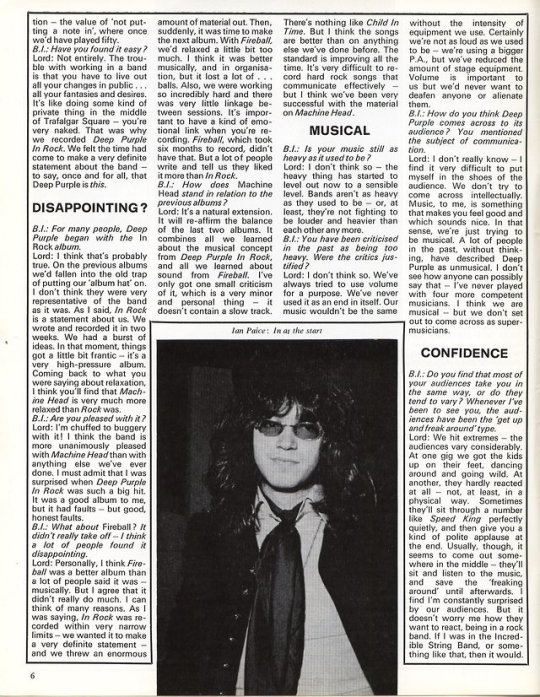
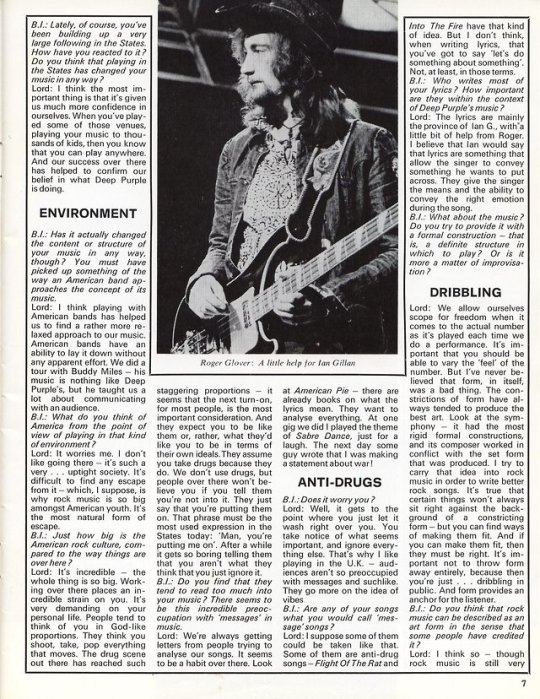
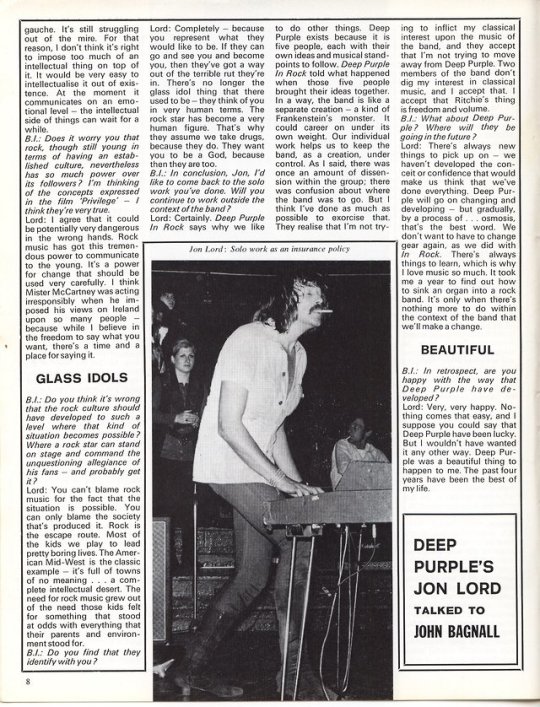
I don’t have any new photos of Jon Lord, but I can offer this interview he did with Beat Instrumental in about 1972.
22 notes
·
View notes
Text
Here’s the translation!
The small paragraph at the top-right reads: Deep Purple is England's most secretive group. Their motto for success: Shhh! This word scares their managers and reporters, because nobody knows what Deep Purple are up to. Their biggest coup: A concert at the venerable Royal Albert Hall, where they launched their first rock'n'roll symphony. This marked the beginning of Deep Purple's triumphant advance around the world.
The caption at the bottom-left: Singer Ian Gillan (24), organist Jon Lord (29), drummer Ian Paice (22), bass guitarist Roger Glover (24) and lead guitarist Ritchie Blackmore (25) love tempo and rhythm, and not just in music.
FIVE ROCKERS KEEP QUIET — AND CASH IN
February 1968: Five young Englishmen rent a secluded farmhouse near Hertfordshire. For two months behind closed doors and barred windows they rehearse hard rock rhythms. Organist Jon Lord composes new songs. Deep Purple quietly dreams of success. Nobody learns of their existence.
In July two years ago, the record “Hush” was quietly released, without any advertising hype. "That's typical for the guys," say a couple of Deep Purple's friends, “the record will never work!” Those friends would be wrong: within six weeks “Hush” is a hit in America. Bandleader Jon Lord, singer Ian Gillan, drummer Ian Paice, bass guitarist Roger Glover and lead guitarist Ritchie Blackmore pack their bags and fly across the ocean.
The next singles, “Kentucky Woman” and “River Deep, Mountain High” are also huge successes in America. In England, on the other hand, Deep Purple aren't pulling any fans out of the woodwork. Not yet!
It wasn't until September 24, 1969 that Londoners woke up. The Royal Philharmonic Orchestra and Deep Purple perform in the Royal Albert Hall. For the first time, a symphony orchestra and a Beat band stand together on the stage. For this event, Jon Lord had composed a 40-minute symphony. The success knocks out Deep Purple. “We were completely surprised,” says Jon Lord to BRAVO. “The English newspapers wrote about us for the first time. All reviews were positive."
Since then, fans have been asking Deep Purple for hard rock'n'roll. Their latest LP “Deep Purple in Rock” is already a gold record. But Jon Lord has a second symphony up his sleeve already. It will be premiered on September 17 at London's Royal Festival Hall. The BBC will broadcast the concert live and in color. “So that fans all over the world can experience the concert, we're going on a mega-tour afterwards - with a symphony orchestra,” says Jon enthusiastically. “In between, however, we get down to it with juicy rock numbers. After all, we're a rock group and prefer to play hard pieces."
K. E. Siegfried

Germany's BRAVO magazine. August 31, 1970
#deep purple#transcript reblog#Ian Gillan#jon lord#ritchie blackmore#roger glover#ian paice#bravo magazine#1970
4 notes
·
View notes
Photo

Unfortunately, I don’t have any info on this article (other than it being from a German magazine) although the members listed in the last paragraph would make it the Genesis lineup of January 1971 to August 1975.
This lineup produced four studio albums (Nursery Cryme [1971], Foxtrot [1972], Selling England By The Pound [1974], The Lamb Lies Down on Broadway [1974]) as well as the 1973 live release Genesis Live.
Edit: I just noticed that this article states their music can be “heard on four LP’s so far,” which would mean this was written after Foxtrot but before Selling England By The Pound.
I’ve previously sent this to @petergabriels-hammer with a promise of translating, so, here it is! If anyone has an additional info about this article clipping, feel free to add it in a reblog or reply!
GENESIS: To the top with sex
When Genesis singer Peter Gabriel — paled face and hair shaved along the middle of his head, eyes bordered with black makeup, seductively facing the audience — prances across the stage with cat-like movements while holding a tambourine as one holds prey, the girls in the auditorium sit breathlessly, only to jump up the next moment to reach out and shake hands with their new idol.
Peter Gabriel, singer of the group Genesis, is a new rock idol. He’s a mix of Mick Jagger and Alice Cooper. Of both, he has the natural sex appeal on stage; from Mick in particular the way of moving. And from Alice the mixture of horror and lust, which he is able to bring to a common denominator with a show full of talent.
Genesis is a group that has slowly grown over the course of two years. Their music — heard on four LP’s so far — can be classified somewhere between ELP and Yes, although on its own, Genesis is far from lacking originality.
The group, consisting of Peter Gabriel (flute, tambourine, vocals), Phil Collins (drums), Tony Banks (keyboard instruments), Steve Hackett (guitars) and Mike Rutherford (bass), have already amassed a large following in Germany and Switzerland…
58 notes
·
View notes
Photo

Clipping from the March 26th, 1976 issue of RAM, an Aussie music mag.
The awards were presented to the band at a club called Lazars on Melbourne’s King Street. The invitations distributed were specially-pressed 7-inch gold-coloured vinyl records, a photo of which can be seen at the bottom of this post.
Now, on to the article....
The photo’s caption reads: Gold record presentation chat from Angus: “The downfall of modern society technological advances is inversely proportional to the non-egalitarian pressures of ‘70s sociopolitical structures, furthermore...
AC/DC gets 6 gold records “I’d just like to thank me,” says Angus Young
It was just an ordinary gold reception for AC/DC in Melbourne on March 1. The group received three gold records for their first album, High Voltage; and another three for their second, T.N.T. Also on the receiving end for gold were AC/DC's producers George Young and Harry Vanda. George Young is elder brother to AC/DC guitarists Angus and Malcolm Young.
It was just a family affair, gold record reception for AC/DC.
It started an hour late while everyone waited for drummer Phil Rudd’s mother to arrive. Bass player Mark Evans’ mother was present throughout and thought the ceremony was “very nice.”
On the other hand, the Young bro’s parents wisely stayed away from the whole shebang, as did vocalist Bon Scott’s.
It was a usual sort of AC/DC celebration.
A young lady jumped out of a cake clutching the first of the gold records, and a belly dancer lost her bra while squirming around the floor. Bon Scott was not believed to be involved in the incident. Vast quantities of alcohol were consumed and the presentation speeches could not be broadcast due to Bon’s rather colourful and expressive language. Angus Young contented himself with saying “I’d just like to thank me.”

13 notes
·
View notes
Text
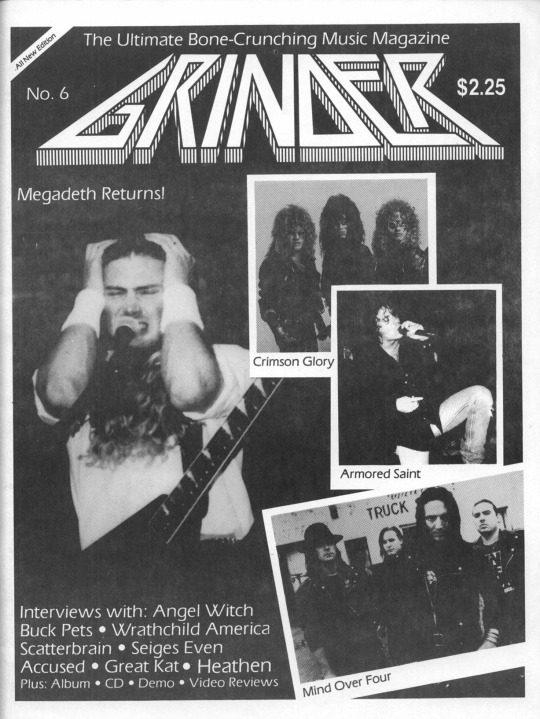






Megadeth in various 80s metal zines (grinder, rock brigade, gray matter, metallic beast, raging death, total deaf, cuero negro)
30 notes
·
View notes
Photo


Morbid Angel
1991
Holocaust Zine #5
62 notes
·
View notes
Text

An advertisement in Melody Maker from July 5th 1969, promoting performances by The Taste and The Nice at The Cherry Tree.
At this time, The Nice were a three-piece band [ Keith Emerson (organ, piano), Lee Jackson (vocals, bass guitar), and Brian Davison (drums, percussion) ] and would release their third album -simply named Nice - two months later.
The Taste were also a three-piece [ Rory Gallagher (guitar, harmonica, vocals, saxophone), Richard McCracken (bass guitar), and John Wilson (drums) ] and had released their self-titled first album only three months prior.
The Cherry Tree was also known as the Bluesville 69 Club, the Cherry Tree Ballroom, and the Cherry Tree Blues Club, and was located on Bridge Road in Welwyn Garden City, Hertfordshire, England.
#concert ad#venue#the taste#taste band#the nice#rory gallagher#keith emerson#1969#melody maker#venue ad#my posts
18 notes
·
View notes
Text
Purple to cut album in Munich; autumn gigs?
DEEP PURPLE, who flew to Italy this week for an appearance in the Rimini Festival on Saturday, travel on to Munich where they spend the first three weeks of August recording a new album for November release. They then leave for a lightning American tour, headlining four stadium concerts. A spokesman for the group said this week that, although no British dates are yet confirmed, the group are expected to undertake some concert appearances here during the autumn.
Purple's Jon Lord has his solo album “Windows” released this weekend. It was recorded in Munich with the orchestra of the Munich Chamber Opera, and is a classic-style set. One side is the completion of an unfinished work by Bach, and the second half is the continuation of Lord's own “Gemini Suite”.

New Musical Express, 27th of July, 1974
Festival in Rimini didn't happen, nor did the autumn UK dates
3 notes
·
View notes
Photo

1971 Atlantic Records US Promotional Poster for The Yes Album
From Yes 50: The First Fifty Years Of Yes 1968-2018 Tour Book
344 notes
·
View notes
Photo

Billboard, Hollywood Bowl, Los Angeles, September 10, 1972
75 notes
·
View notes